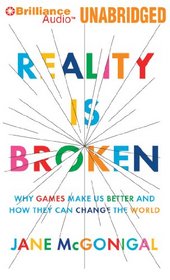I'm in the game industry, though my design chops are still mired in the 1980s. (My job doesn't actually involve design.) And for me especially, this book was fascinating.
The book posits two polarizing but popular viewpoints: Games are causing our youth to avoid reality, and should thus be banned; and: Reality sucks, and so let's become networked gamers and avoid the real world completely.
And then the book threads its way down the middle: young people today are training themselves on "how to game", so... why? The thesis: because the rewards of gaming are so much better than the rewards of reality. But if society can understand what those rewards actually *are* and how games make them happen, then those same things can be used for real-world issues and suddenly people will become more interested in actually dealing with those real-world issue. (Thus: chorewars.com, as a light-hearted example.)
McGonigal puts it much better than I have. Essentially, I think this book is a great read for anybody actually doing game design, but more importantly, for anybody who wants to motivate people to *do* things. I was quite impressed.
4 of 5 stars.
The book posits two polarizing but popular viewpoints: Games are causing our youth to avoid reality, and should thus be banned; and: Reality sucks, and so let's become networked gamers and avoid the real world completely.
And then the book threads its way down the middle: young people today are training themselves on "how to game", so... why? The thesis: because the rewards of gaming are so much better than the rewards of reality. But if society can understand what those rewards actually *are* and how games make them happen, then those same things can be used for real-world issues and suddenly people will become more interested in actually dealing with those real-world issue. (Thus: chorewars.com, as a light-hearted example.)
McGonigal puts it much better than I have. Essentially, I think this book is a great read for anybody actually doing game design, but more importantly, for anybody who wants to motivate people to *do* things. I was quite impressed.
4 of 5 stars.




